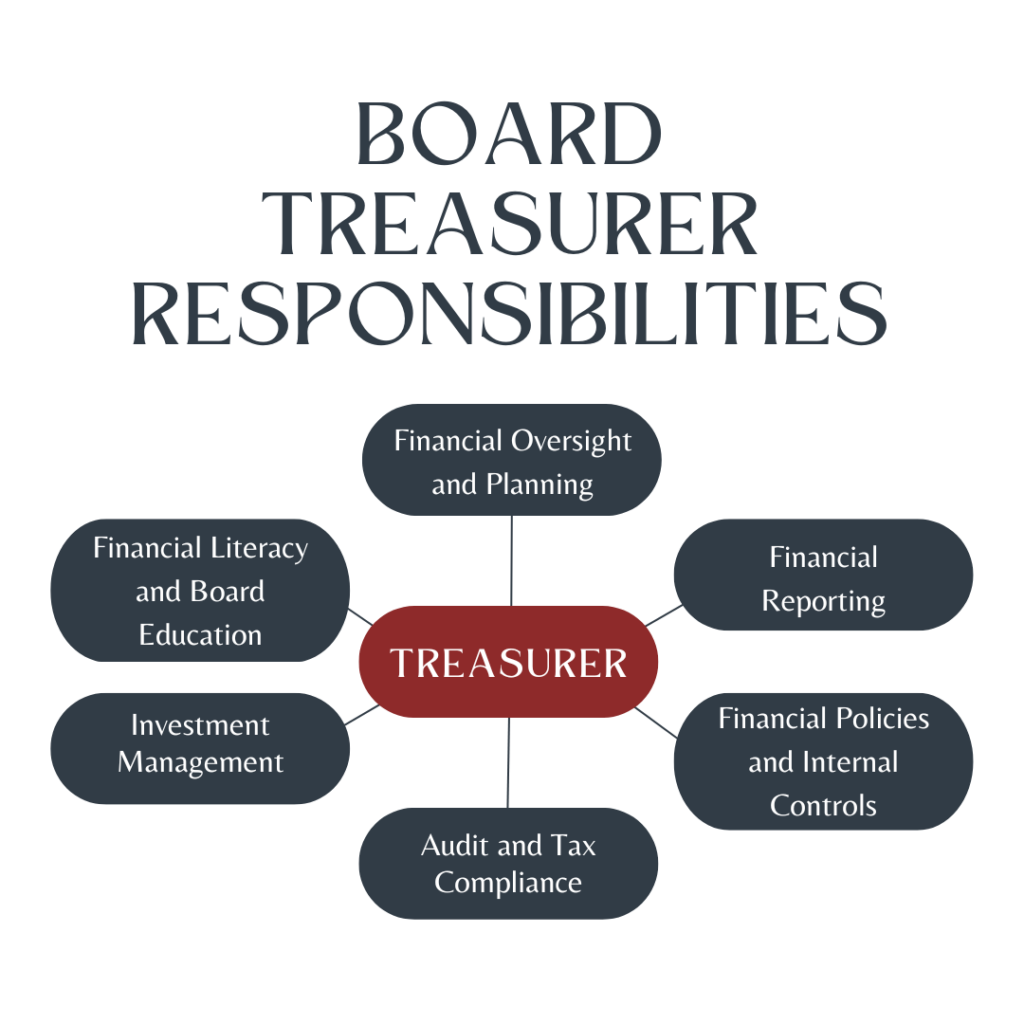
In the vast and diverse landscape of nonprofit organizations, few roles are as critical as that of the board treasurer. A nonprofit board treasurer holds the key to the organization’s financial stability and sustainability, ensuring that its resources are managed responsibly and directed toward fulfilling the mission.
In this blog, we will explore the indispensable role of a nonprofit board treasurer, shedding light on their specific responsibilities and the importance of their expertise in maintaining the financial health of the organization. From strategic financial planning to meticulous record-keeping, the board treasurer plays a pivotal role in steering the nonprofit toward meeting its goals.
The Responsibilities of a Nonprofit Board Treasurer

Financial Oversight and Planning:
The foremost responsibility of a nonprofit board treasurer is to provide financial oversight. While leading the finance committee, they collaborate with the executive director and other board members to develop a comprehensive budget aligned with the organization’s mission and objectives. A diligent treasurer actively monitors the Statement of Financial Position and the Statement of Activities, ensuring that the organization is healthy and adheres to the budget and allocates resources efficiently.
Financial Reporting:
Transparency is of paramount importance in nonprofit organizations, and it is the board treasurer’s duty to provide accurate, timely, and accessible financial reports to the board. These reports should include information on the organization’s financial performance, cash flow, and any potential risks or challenges. The treasurer must present these reports in a clear and concise manner to enable informed decision-making by the board.
Financial Policies and Internal Controls:
A board treasurer must work in conjunction with the finance committee to maintain robust financial policies and internal controls. These policies serve as guidelines for handling financial matters, preventing fraud, and ensuring compliance with relevant laws and regulations. Maintaining a strong internal control system safeguards the nonprofit’s assets and fosters accountability within the organization.
Audit and Tax Compliance:
Nonprofit organizations are subject to various reporting requirements and tax regulations. The treasurer plays a key role in liaising with external auditors to conduct annual financial audits and file the necessary tax forms. Some nonprofits even establish an audit committee separate from the finance committee. Their commitment to accurate and thorough financial records helps maintain the nonprofit’s credibility and public trust.
Investment Management:
For nonprofits with investment portfolios or endowment funds, the treasurer oversees the management of these assets. They work with investment professionals to make prudent financial decisions that align with the organization’s long-term financial objectives while taking into consideration ethical investment practices.
Financial Literacy and Board Education:
To ensure the board’s collective understanding of financial matters, the treasurer plays an essential role in fostering financial literacy among board members. The treasurer communicates financial information clearly and effectively to empower the board to make informed decisions related to the organization’s finances.
The Qualities of an Effective Nonprofit Board Treasurer
Financial Expertise:
An effective nonprofit board treasurer should possess a strong background in finance, accounting, or related fields. They should be well-versed in financial management principles, budgeting techniques, and financial analysis. Ideally, they would also be familiar with nonprofit accounting requirements. This expertise enables them to provide valuable insights and guide the organization towards financial stability.
Integrity and Ethical Conduct:
Integrity is the bedrock of a nonprofit’s reputation. The treasurer must uphold the highest ethical standards, prioritizing the organization’s interests over personal gain. This includes transparent communication about any potential conflicts of interest and the ability to make impartial financial decisions.
Commitment and Accountability:
Serving as a nonprofit board treasurer demands a significant commitment of time and effort. The individual must be dedicated to fulfilling their responsibilities diligently and be accountable for their actions and decisions. A proactive approach to problem-solving and a willingness to take responsibility for financial outcomes are crucial attributes.
The role of a nonprofit board treasurer is both critical and multifaceted. Their financial expertise, commitment to transparency, and adherence to ethical standards are essential for the organization’s sustainability and growth. By assuming responsibility for financial oversight, strategic planning, and compliance, the treasurer contributes significantly to the nonprofit’s ability to fulfill its mission and create a positive impact in the community.
As nonprofit organizations continue to play an indispensable role in addressing societal challenges, the value of an effective board treasurer becomes even more pronounced. By embracing this pivotal role with dedication and skill, these financial stewards can empower nonprofits to thrive and bring about meaningful change in the world.
Share This Post:

Chazin
With over 20 years working exclusively with nonprofits, we pride ourselves in having a unique understanding of nonprofit accounting needs. We believe that nonprofits deserve personalized, quality service and should not settle for a one-size-fits-all approach. We collaborate with you to provide a fully virtual and customized solution that is not only cost-effective but also strengthens your accounting function. We offer a team of industry experts at your disposal to provide advice, leading technology, and to supplement existing staff to improve efficiency and compliance.